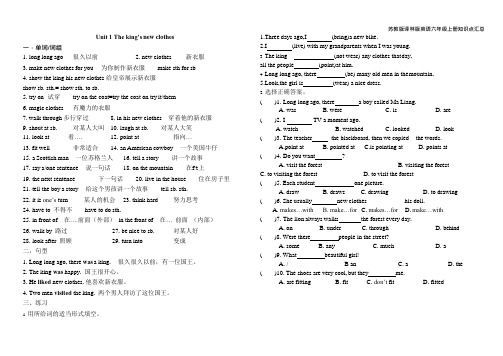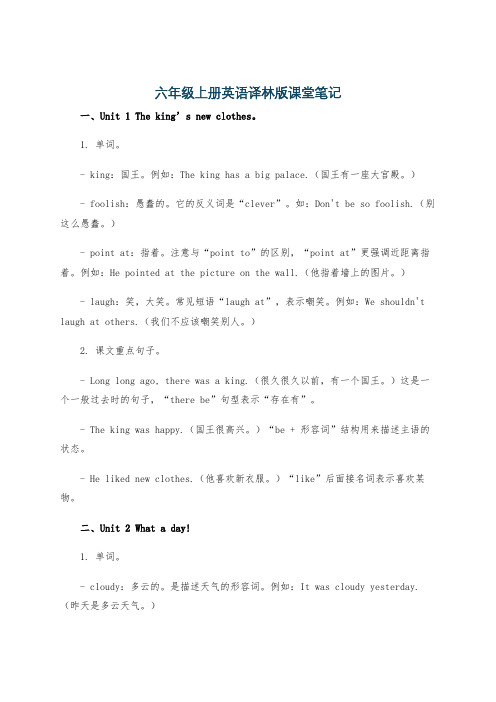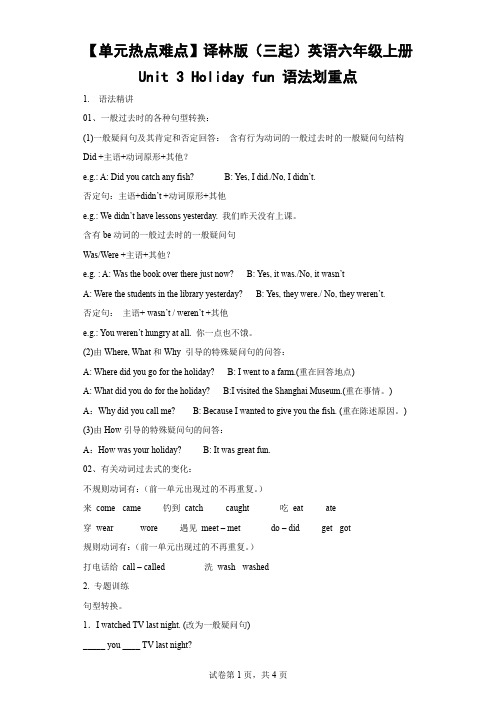译林版六年级英语上册知识点梳理
(完整)苏教版译林版英语六年级上册复习知识点汇总,推荐文档

一,单词/词组Unit 1 The king’s new clothes 1.Three days ago,I (bring)a new bike.2.I (live) with my grandparents when I was young.1. long long ago 很久以前2. new clothes 新衣服3.make new clothes for you 为你制作新衣服make sth for sb4.show the king his new clothes 给皇帝展示新衣服show sb. sth.= show sth. to sb.5.try on 试穿try on the coat=try the coat on try it/them6.magic clothes 有魔力的衣服3.The king (not wear) any clothes that d ay,all the people (point)at him.4.Long long ago, there (be) many old men in the m ountain.5.Look,the girl is (wear) a nice dress.2.选择正确答案。
( )1. Long long ago, there a boy called Ma Liang.A. wasB. wereC. isD. are7. walk through 步行穿过8. in his new clothes 穿着他的新衣服( )2. I TV a moment ago.9. shout at sb. 对某人大叫10. laugh at sb. 对某人大笑11. look at 看….12. point at 指向…13. fit well 非常适合14. an American cowboy 一个美国牛仔15. a Scottish man 一位苏格兰人16. tell a story 讲一个故事17. say a/one sentence 说一句话18. on the mountain 在ft上19. the next sentence 下一句话20. live in the house 住在房子里21.tell the boy a story 给这个男孩讲一个故事tell sb. sth.22.it is one’s turn 某人的机会23. think hard 努力思考24.have to 不得不have to do sth.25.in front of 在….前面(外部)in the front of 在… 前面(内部)26.walk by 路过27. be nice to sb. 对某人好28. look after 照顾29. turn into 变成二,句型1.Long long ago, there was a king. 很久很久以前,有一位国王。
六年级上册英语译林版课堂笔记

六年级上册英语译林版课堂笔记一、Unit 1 The king’s new clothes。
1. 单词。
- king:国王。
例如:The king has a big palace.(国王有一座大宫殿。
)- foolish:愚蠢的。
它的反义词是“clever”。
如:Don't be so foolish.(别这么愚蠢。
)- point at:指着。
注意与“point to”的区别,“point at”更强调近距离指着。
例如:He pointed at the picture on the wall.(他指着墙上的图片。
)- laugh:笑,大笑。
常见短语“laugh at”,表示嘲笑。
例如:We shouldn't laugh at others.(我们不应该嘲笑别人。
)2. 课文重点句子。
- Long long ago, there was a king.(很久很久以前,有一个国王。
)这是一个一般过去时的句子,“there be”句型表示“存在有”。
- The king was happy.(国王很高兴。
)“be + 形容词”结构用来描述主语的状态。
- He liked new clothes.(他喜欢新衣服。
)“like”后面接名词表示喜欢某物。
二、Unit 2 What a day!1. 单词。
- cloudy:多云的。
是描述天气的形容词。
例如:It was cloudy yesterday.(昨天是多云天气。
)- rainy:下雨的。
同样是天气类形容词,其名词形式是“rain”。
如:We can't go out on a rainy day.(下雨天我们不能出去。
)- show:展示;演出。
例如:She showed me her new book.(她给我看了她的新书。
)也可以说“a fashion show”(时装秀)。
- dumpling:饺子。
这是一个可数名词。
【单元热点难点】译林版(三起)英语六年级上册Unit 3 Holiday fun 语法重点(含解析)

【单元热点难点】译林版(三起)英语六年级上册Unit 3 Holiday fun 语法划重点1. 语法精讲01、一般过去时的各种句型转换:(1)一般疑问句及其肯定和否定回答:含有行为动词的一般过去时的一般疑问句结构Did +主语+动词原形+其他?e.g.: A: Did you catch any fish? B: Yes, I did./No, I didn’t.否定句:主语+didn’t +动词原形+其他e.g.: We didn’t have lessons yesterday. 我们昨天没有上课。
含有be动词的一般过去时的一般疑问句Was/Were +主语+其他?e.g. : A: Was the book over there just now? B: Yes, it was./No, it wasn’tA: Were the students in the library yesterday? B: Yes, they were./ No, they weren’t.否定句:主语+ wasn’t / weren’t +其他e.g.: You weren’t hungry at all. 你一点也不饿。
(2)由Where, What和Why 引导的特殊疑问句的问答:A: Where did you go for the holiday? B: I went to a farm.(重在回答地点)A: What did you do for the holiday? B:I visited the Shanghai Museum.(重在事情。
)A:Why did you call me? B: Because I wanted to give you the fish. (重在陈述原因。
)(3)由How引导的特殊疑问句的问答:A:How was your holiday? B: It was great fun.02、有关动词过去式的变化:不规则动词有:(前一单元出现过的不再重复。
六年级上册英语素材Unit1第一单元短语词汇知识点梳理译林版

Unit1Theking’snewclothes知识点梳理一、短语累积theking’s clothes皇帝的新装longlongago好久从前oneday有一天twomen/women两个男人/女人likenewclothes喜爱新衣服makefor给做visittheking拜见国王showsthtosbshowsbsth展现给看tryonthesemagicclothes试穿这些魔力衣服10.clever/foolishpeople聪慧/愚笨的人alotof/lotsof/manypeople很多人11.walkthroughthecity步行穿过这座城市lookat看inthestreet在街上shoutat向..大叫alittleboy一个小男孩pointat指着laughat嘲讽inthenewclotheswearthenewclothes衣着新衣服wearyellow穿黄色的衣服fitwell很合适getfrom从获得cometomyparty来参加我的聚会athalfpastfour在四点半anAmericancowboy一个美国的西部牛仔二、要点句型、语法点拔1、therebe构造在一般过去时的各样句型变换:aScottishman一个苏格兰男人wearjeans衣着牛仔裤wearakilt穿苏格兰短裙playagame/playgames做游戏,玩游戏tellastory/tellstories讲故事each/everystudent每一个学生sayonesentence说一个句子onthemountain在山上thenextsentence下一个句子livein居住在Bobby’sturn博比的时机What’snext?接下来呢?thinkhard绞尽脑汁haveto不得不,一定startagain从头开始intheforest在丛林里infrontof在前面bythehouse房屋邻近pickaflower/pickflowers摘一朵花beangry生气的pickup捡起,拾起givemeyourchild把你的孩子给我benicetoher(宾格)对她很好livewiththelion和狮子住在一同lookafter照料turnintoaprince变为一个王子Whatbeautifulclothes!多美丽的衣服啊!第1 页Therebe构造的构成:Therebe+名词短语+方向短语.(数目词+名词)(1)一定句:e.g.: Longlongago,therewasaking./Therewerealotofpeopleinthestreet.(2)否认句:在be动词was或were后+not,some要改成any.e.g.: Thereweresomepeopleinthestreet否.(定句)Therewere notany peopleinthestreet.一般疑问句及其一定和否认回答:e.g.:A:Was thereahouseonthemountain?Yes,therewas./No,therewasn’t.(4)相关therebe的特别疑问句的问答:A1:Whatwasinfrontofthelion’shouse?(针对名词短语发问)B1:Thereweresomeflowers.A2:Howmanyhouseswerethereonthemountain?(针对数目词发问)B2:Therewasone.2、动词在一般过去时中的变化:a、be动词在一般过去时中的变化:was/were.此中Checkouttime中的circleandsay进行了要点操练。
江苏译林版英语六年级上册知识点整理全

六年级上册复习资料内含:6A各单元知识点,语法知识,易错题及适当形式填空6A Unit1Theking’snewclothes姓名:一,单词/词组1.longlongago 很久以前2.newclothes 新衣服3.makenewclothesforyou 为你制作新衣服makesthforsb4.showthekinghisnewclothes给皇帝展示新衣服showsb.sth.=showsth.tosb.5.tryon 试穿tryonthecoat=trythecoatontryit/themon6.magicclothes 有魔力的衣服7.walkthrough步行穿过8.inhisnewclothes穿着他的新衣服9.shoutatsb. 对某人大叫 ughatsb. 对某人大笑11.lookat看….12.pointat 指向…13.fitwell 非常适合14.anAmericancowboy一个美国牛仔15.aScottishman一位苏格兰人16.tellastory讲一个故事17.saya/onesentence 说一句话18.onthemountain 在山上19.thenextsentence 下一句话20.liveinthehouse 住在房子里21.telltheboyastory 给这个男孩讲一个故事tellsb.sth.22.itisone’sturn某人的机会23.thinkhard 努力思考24.haveto不得不havetodosth.25.infrontof在….前面(外部)inthefrontof在…前面(内部)26.walkby路过27.benicetosb. 对某人好28.lookafter照顾29.turninto 变成二,句型1.Longlongago,there was aking.很久很久以前,有一位国王。
2.Theking was happy.国王很开心。
译林版英语六年级上学期整册知识点整理

Unit6
Keep our city clean
维护城市的清洁
宾语补足语
例句:
What makes the air clean?
什么使空气清洁?
What makes the streets messy and dirty?
什么使街道脏乱?
Unit 7
Protect the earth
节假日的乐趣
1.一般过去时的一般疑问句。
2.一般过去时的特殊疑问句及其回答。
Unit 4
Then and now
过去和现在
一般过去时与一般现在时的对比运用。
Unit 5
Signs
标志
1.句型:What does it mean?It means you can’t ...
这是什么意思?它的意思是你不能......
Unit 8
Chinese New Year
中国新年
一般讲来时be going to do的用法
What are you going to do at Chinese New Year?
你打算在中国新年干什么?
单元
语法项目
Unit 1
The king’s new hes
皇帝的新衣
1.一般过去时的肯定句。
2.be动词am,is的过去式was;
be动词are的式were
3.规则变化的动词过去式。
Unit 2
What a day!
糟糕的一天!
1.特殊变化的动词过去式。
2.名词+y变形容词
Unit 3
Holiday fun
保护地球
1.不定式(to do)做目的状语
[译林版]六年级英语上册Unit8 Chinese New Year知识点梳理
![[译林版]六年级英语上册Unit8 Chinese New Year知识点梳理](https://img.taocdn.com/s3/m/6e52d05ba26925c52dc5bf16.png)
六年级英语上册Unit8 Chinese New Year知识点梳理一、重点词汇:1. 中国新年Chinese New Year2. 收到一份来自她网友的电子邮件get an email from her e-friend3. 在香港in Hong Kong4. 下周next week5. 非常激动be very excited6. 买些新衣和食物buy some new clothes and food7. 在晚上in the evening8. 做些汤圆make some tangyuan9. 在除夕夜on Chinese New Year’s Eve 10. 吃晚饭have dinner11. 买些花buy some flowers 12. 在大年初一 on Chinese New Year’s Day13. 给某人红包give sb. red packets 14. 观看舞狮表演watch a lion dance15. 在大年初二on the second day of Chinese New Year 16. 看烟花表演watch fireworks 17. 在春节期间at Chinese New Year 18. 在你的生日那天on your birthday19. 寻找一些好东西look for something good20. 最重要的节假日the most important holiday / festival21. 一个很重要的假日a very important holiday 22. 在厨房煮饺子cook dumplings in the kitchen 23. 得到红包get red packets 24. 谈论/讨论talk about25. 他们年初一的计划their plans for Chinese New Year’s Day 26.收到你的电子邮件get your email 27. 买许多东西buy a lot of things 28. 放一些鞭炮和烟花light some firecrackers and fireworks 29. 新春快乐Happy Chinese New Year 30. 谈论中国新年talk about Chinese New Year二、重点句型:1. Chinese New Year is coming. 春节就要到了。
新译林版六年级上册英语知识点归纳总结

Unit 1 The king's new clothes1、一般过去时一般过去时的概念一般过去时表示过去某个时间发生的动作或存在的状态。
一般过去时的形式○1be动词的一般过去时形式be动词的一般过去时的构成是“主语+be(was/were)+其他”。
例如:I was ill yesterday. 我昨天生病了。
The boys were happy last weekend. 男孩们上周末很开心。
○2实义动词的一般过去时形式实义动词的一般过去时的构成是“主语+动词的过去式+其他”。
例如:She went shopping last Sunday. 她上周日去购物了。
I caught a big fish on the farm last weekend. 我上周末在农场抓了一条大鱼。
一般过去时的句型○1肯定句:“主语+谓语动词的过去式+其他”。
例如:It was rainy yesterday. 昨天下雨了。
We had a picnic last week. 上周我们去野餐了。
○2否定句:“主语+was/were +not+ 其他”或者“主语+didn't+谓语动词原形+其他”。
例如:It wasn't rainy yesterday. 昨天没下雨。
We didn't have a picnic last week. 上周我们没有去野餐。
○3一般疑问句及回答:“Was/Were+主语+其他”或者“Did+主语+谓语动词原形+其他”,其肯定回答分别为“Yes,主语+did”或“Yes,主语+was/were”,否定回答分别为“No,主语+didn't”或“No,主语+wasn't/weren't”。
例如:—Was it rainy yesterday? 昨天下雨了吗?—Yes, it was. 是的,下雨了。
—Did you have a picnic last week? 你们上周去野餐了吗?—No, we didn't. 不,我们没有去。
- 1、下载文档前请自行甄别文档内容的完整性,平台不提供额外的编辑、内容补充、找答案等附加服务。
- 2、"仅部分预览"的文档,不可在线预览部分如存在完整性等问题,可反馈申请退款(可完整预览的文档不适用该条件!)。
- 3、如文档侵犯您的权益,请联系客服反馈,我们会尽快为您处理(人工客服工作时间:9:00-18:30)。
译林版六年级英语上册知识点梳理In Unit 1.we learn about the story of "The King's New Clothes"。
We learn several vocabulary words such as "magic"。
"clothes"。
"clever"。
"foolish"。
"through"。
"laugh"。
"shout"。
"another"。
"each"。
"think"。
"hard"。
"next"。
"sentence"。
"wear"。
"tell"。
"little"。
and "child"。
We also learn some useful phrases such as "long long ago"。
"try on"。
"point at"。
"make new clothes for him"。
"show sb。
sth."。
"turn into"。
"make a sentence"。
"XXX"。
"tell sb。
a story"。
"live in"。
"be nice to"。
"look after"。
"it is one's turn"。
"have to"。
and "in front of".There are some key sentences in this unit。
such as "Long long ago。
there was a king"。
"Two men visited the king"。
"We can make new clothes for you"。
"The two men XXX"。
"XXX through the city in his new clothes"。
and "What beautiful clothes!".In terms of grammar。
we learn about the simple past tense.一般过去时是用来描述过去某一时刻或某一段时间发生的事情或状态的。
通常与一些表示过去时间的状语连用,如yesterday。
this morning。
just now。
a moment ago。
in May。
last night / year / week。
once upon a time。
the other day。
before…。
when-clause。
in the past。
例如:很久很久以前,有一个国王。
他喜欢新衣服。
这里的“很久很久以前”就是过去时的时间状语。
动词be(am,is,are)的过去式分别是was和were。
不规则动词的过去式有laughed。
lived。
liked。
looked等。
一般过去时的基本结构有两种:主语+be(was,were)+宾语+其他,例如:他是一个小男孩。
主语+动词的过去式+宾语+其他,例如:我们带了一些面包和蜂蜜去公园。
本单元的四会单词包括sunny(晴朗的)、windy(有风的)、cloudy(多云的)、rainy(有雨的)、weather(天气)、e(变成,变为)、honey(蜂蜜)、drink(饮料)、sky(天空)、bring(带来)、bread(面包)、meet(遇见)、ant(蚂蚁)、high(在高处)、know(知道)、cloud(云)、rain(下雨)、lose(丢失)、parrot(鹦鹉)、show(展览,展示)、interesting(有趣的,有意思的)。
本单元的重点词组包括:a parrot show(一场鹦鹉表演)、fly kites / a kite(放风筝)、by bike / ride a bike(骑自行车)、high in the sky(在高空中)、rain all day(下了一整天的雨)、well done(干得好)、look sad(看起来伤心)、fly away(飞走)、fly high(飞得高)、black clouds(乌云)、e windyand cloudy(变得有风多云)、what happened?(出什么事了?)、climb up(爬上)、hold onto(抓紧)、watch a film (看电影)、do housework(做家务)。
On Monday morning。
XXX。
what a day it turned out to be。
The XXX disappointed.As for grammar。
XXX irregular verbs such as e。
can。
go。
take。
bring。
fly。
see。
lose。
climb。
happen。
find。
and want.In Unit 3.XXX。
call。
Bund。
XXX。
excited。
paper。
ask。
XXX such as Shanghai Museum。
Great Wall。
nal Day。
Palace Museum。
Summer Palace。
at first。
Tian'anmen Square。
a nshow。
heavy rain。
come back to school。
the summer holiday。
go well。
pick some oranges。
be excited about。
ask about。
wear paper clothes。
and it is time to do something.In terms of sentence structures。
XXX did for the holiday。
For example。
"What did you/he do for the holiday?" and "He visited the Shanghai Museum." We also learned how to answer yes or no ns。
such as "Did you go fishing?" with "Yes。
I did." or "No。
I XXX't."A: Where did you go for your holiday?B: 我去哪儿度假的啊?A: XXX.B: 我看到很多有趣的东西。
A: How was your holiday?B: 你的假期过得怎么样?XXX fishing。
我们摘了很多橘子和去钓鱼。
Unit 4 Then and Now1.四会单词:收音机ago 以前use 用watch 观看XXX 电话office 办公室newspaper 报纸news 新闻e-book 电子书with 用XXX 随处,到处XXX 昨天n (TV) 电视2.重点词组:read e-book 读电子书listen to the。
听收音机go on 继续on the。
在网上XXX 从商店买东西do many XXX 做很多事work hard 努力工作make friends 交朋友all over the world 全世界do shopping 购物look out of 朝……外看spell 拼读,拼写make a sentence 造句then and now 过去和现在wait for 等待mobile phone 移动电话,手机get angry 变得生气3.重点句型:1.He used the telephone at home and in the office to call people.他在家和办公室都用座机给人打电话。
2.XXX'XXX.XXX的爷爷通过听收音机和看报纸获取新闻。
3.XXX.她从商店买东西。
4.Now she has e-friends from all over the world. 现在她有来自全世界的电子朋友。
littering: 乱扔垃圾garbage: 垃圾recycle: 回收利用environment: 环境n: 污染pick up: 捡起throw away: 扔掉clean up: 清理public: 公共的campaign: 运动awareness: 意识2.重点句型:We should keep our city clean and tidy。
我们应该保持城市的干净整洁。
XXX。
不要在街上乱扔垃圾。
We need to XXX。
我们需要回收利用来保护环境。
XXX to our health。
污染对我们的健康有害。
Let's pick up the trash and throw it away properly。
让我们捡起垃圾并妥善处理。
We can clean up the public XXX。
我们可以一起清理公共场所。
XXX to keep our city clean。
参加保持城市清洁的运动。
We need to raise awareness about the XXX。
我们需要提高人们保持城市清洁的重要性意识。
3.改写:It is important for us to maintain the cleanliness of our city。
We must not XXX to our health。
so we must take n to keep our city clean.XXX of it。
We can also clean up public XXX to keep our city clean。
we can raise awareness about the XXX.Keep Our City CleanIt is important to keep our city clean。
